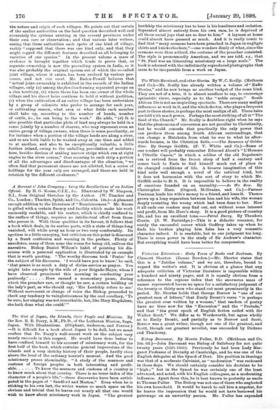The White Hecatomb, and other Stories. By W . C.
Scully. (Methuen and Co.)—Mr. Scully has already written a volume of" Kaffir Stories," and he now brings us another budget of the same kind. They are not of a tone, it is almost needless to say, to encourage optimistic views, especially as to the "noble savage." South African life is not an inspiriting spectacle. There are many malign influences at work in it, and the witch-doctor, who plays a frequent part in these stories, is perhaps the most malign of all. These tales are told with much power. Perhaps the most striking of all is "The Seed of the Church." Mr. Scully is doubtless right when he says that the phenomena of conversion are not peculiar to Christianity, but he would concede that practically the only power that can produce them among South African surroundings, that can change a Matshaka from what he was to what he after- wards became, is the Christian faith.—The Romance of Golden Star. By George Griffith. (F. V. White and Co.)—Some of our readers will probably remember Edmond About's " L'Homme l'Oreille Cameos," in which a soldier of the old Napoleonic era is revived from the frozen sleep of half a century and comes back to Paris to find himself much out of place in its changed conditions of life. A bizarre imagination of this kind suits well enough a novel of the satirical kind, but it does not harmonise with the sort of story to which Mr. Griffith seeks to fit it. It is impossible to believe in the reality of emotions founded on an unreality.--As We Sow. By Christopher Hare. (Osgood, Mellvaine, and Co.)—Farmer Yeatman lends his wife's money to a friend, and loses it. Thence grows up a long separation between him and his wife, the woman deeply resenting the wrong which had been done to her. How it all ends our readers may find out, not without some interest and profit, from Mr. Hare's story. It is a good picture of country life, and has an excellent tone.—Petrel Darcy. By Theodora Corrie. (S. W. Partridge.)—This is a didactic romance, for surely the successful career which Godfrey takes up when he finds his brother playing him false has a very romantic character indeed. It is readable, but to our judgment too long. There is some power in the study of Sir Andrew's character. But everything would have been better for compression.


















































 Previous page
Previous page